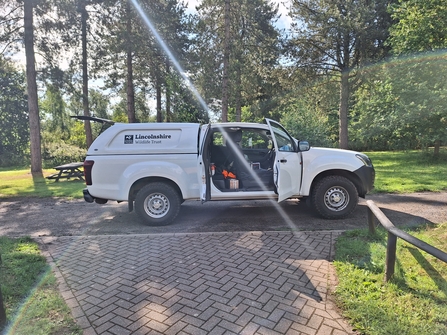
Warden's Work - Snipe Dales in July
Robert Enderby

I arrived at 9am and we started to load the car for our day ahead. The first thing James told me was about the pole saw he was sharpening for us to use that day and I simply smiled as if I was aware of what one of those is (apparently a very long saw that is for cutting tree branches beyond arm’s reach). He ran me through the list of jobs we had to complete during the day, some compulsory like checking on the livestock and some extra jobs that would have been nice to get around to if the rest didn’t take up all of our time.
Apparently around July is a good time to mark dying Ash trees with spray paint as you can tell them apart from the other trees. In a month or so the healthy ones will start naturally losing their leaves so it’s harder to tell.
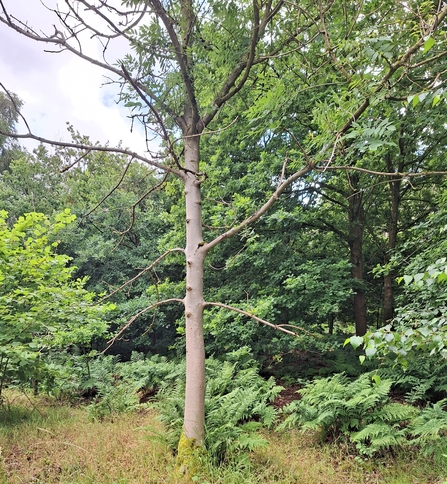
Ash tree affected by ash dieback
As we travelled around, we saw an ash tree affected by ash dieback (a fungal disease) next to an alive one and the difference was clearly visible, like winter had struck just one spot. A risk assessment needed to be carried out of whether the tree was in a dangerous position of falling on the public (too close to the path) and if it was big enough to cause damage. The decision was to leave that one unmarked because it was far from the path so was not at risk of falling onto anyone and the dead wood on the ground can actually create a home for many species.
As I drove around the site with James it became clear just how many factors there are to think about. It is not as simple as good or bad in nature and everything has to be perfectly thought out to ensure the best possible results for a wide range of bio-diversity. James’ knowledge of the site was exceptional, each tree had its story and the passion was clear in his voice.
Once we checked on some Highland ponies, we made our way over to the field containing our Lincoln red cattle. James explained to me how important the livestock is at grazing and managing the site and it really highlighted to me how good nature is at just getting on with it. Our job was to move around the cattle to manage the grass. As there were no schools visiting this week, it was a good chance to move them onto the paths where the cattle would naturally clear the way, as they enjoy the fresher grass where the paths have been cut. It also keeps them from eating all the other food in the field where they will spend most of their time during the summer holidays.
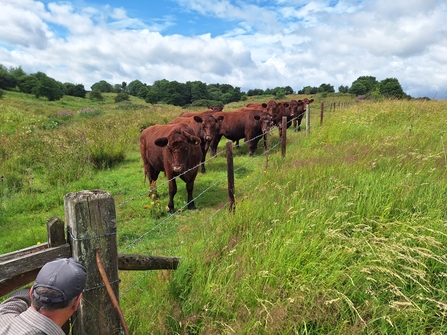
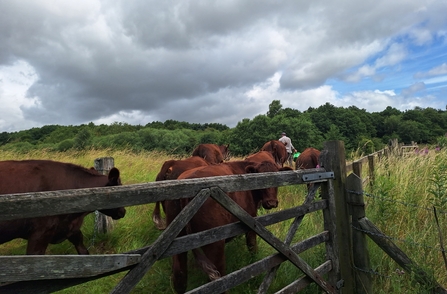
Lincoln red cattle following James
The cattle were very well behaved and listened more than you would imagine a pack of dogs would. They were extremely friendly and curious, and even had a particular fondness of my leg that they used to scratch their heads against. Of course though, there is always one who won’t do as they’re told...
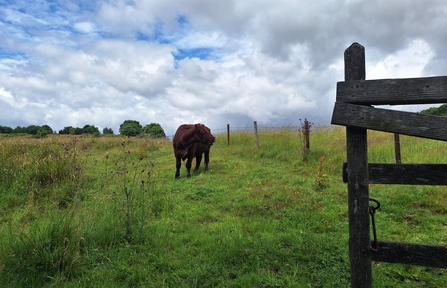
A stubborn individual!
The next task of the day was to cut down a branch of willow tree that was over the path and could have potentially fallen on pedestrians, or more likely the fence and let the livestock out. Whilst it could have just been a simple task to complete, it became clear to me that a Warden is always thinking of the bigger picture. James mentioned that he planned to use the cuttings the next day to create a natural barrier to prevent the soil washing down towards the stream, with the hope that these cuttings that were knocked into the ground may root and help bind the soil together. He said to me he tries to get ‘multiple benefits from a particular task’ which was something that really resonated with me. A Warden’s job is not just following a checklist of jobs but using their initiative and knowledge of the site to see how their actions can best benefit it.
We spent most of the afternoon venturing to a few of the other sites nearby, carrying out various jobs on each before returning to Snipe Dales. And then James dropped the bombshell. Wednesday was dog poo cleaning day. We would have to drive around to each bin on the site and swap over the bags with new ones. I would like to say I am eternally grateful that I was encouraged to stay in the truck for this part, a mere observer imagining the horrid smell that James must be suffering. As we drove back to the car park up and down the winding roads of Snipe Dales, with the bag of dog poo on the bonnet, I just hoped we didn’t go over too large a bump that would send the bag flying down the path. Luckily, all was fine and I was spared any horrible jobs on my first visit to Snipe Dales. I’m not sure all the trips will be so easy for me, as James did mention it was his job to clean the toilets, something I’m sure he would be thrilled to allow me to do!
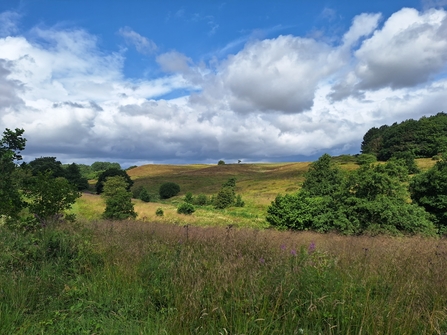
Snipe Dales in July

